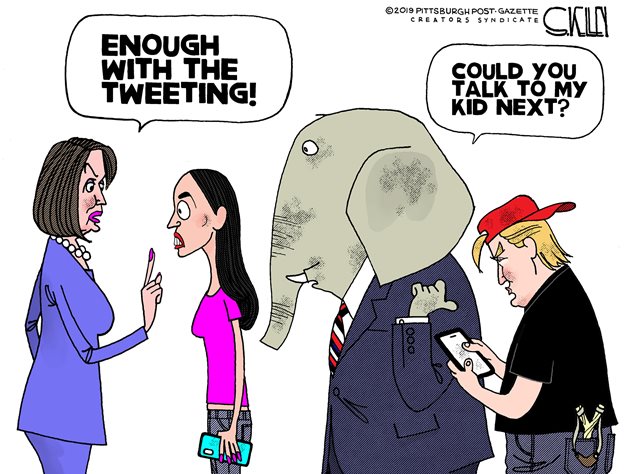Twitter is not inherently evil. Like all technological developments, it depends how it is used. I have few problems with it because I follow only those people and organizations that speak either God’s truths and/or are faithful to the principles He has established. There are some, however, who seem to see it as a weapon—and it comes from both sides of the political arena:

President Trump stirred up controversy (again) recently with a couple of pointed tweets. One targeted a group of four Democrat congresswomen that has, in the journalistic trend of the day, now been called “The Squad.”

When one examines the worldview of these congresswomen, one can easily critique the radicalism they promote. And if one opposes their policies (as I do) the response should be to show the error of their ways, not demean them personally. But that’s not the Trump way; to him, it’s always personal. So when he tweeted they should go back to the countries they came from and fix things there first, he stepped into a pile of ignorance: three are natural-born Americans; the fourth was naturalized as a child.
Trump’s tweet was then taken by the liberal media to be a statement of racism since none of these women are white. Now all we hear in the mainstream media is that Trump is a racist. I don’t know that for sure; I’m not jumping on that bandwagon. But what I do know is that he, regardless of his advanced age, is immature, petty, and rather juvenile. That character, along with a large dose of ignorance, is why I have a problem with his presidency.
That said, one reason why I won’t immediately accuse him of racism is that that particular accusation has become so common, and applied to anything and everything, that it has become almost meaningless.

That same cartoonist also offered this with respect to one of the “Squad”:

Trump then tweeted about congressman Elijah Cummings, an African-American who represents Baltimore. He referred to Cummings’s district as rat-infested and as a place no person would want to live. Again, this was perceived as a racist statement from a racist president. It’s easy to jump to that conclusion, especially when you want to.
There’s a simpler explanation as to why Trump attacked Cummings: he’s heading the congressional committee holding hearings that amount to an impeachment inquiry. Trump doesn’t necessarily see Cummings in a racial perspective; it’s just that he’s the “enemy” who is attempting to remove him from office.
Now, stepping back a little, I can see why I might be somewhat sensitive to charges of racism. In a previous university, when I was explaining why America’s Founders at the Constitutional Convention didn’t outlaw slavery at that time, I found out later that at least one African-American student thought I was making a racist statement. No, it was purely historical fact.
Then, a few years ago, during the Ferguson controversy, I referred to Michael Brown, the man who was killed when he robbed a store and then attacked a police officer, as a “thug.” A former student made a big deal out of this and called for me to be dismissed because of my “racist” comment.
No, I will call anyone who robs a store in the manner in which Brown did and then reached into a police car to try to take a policeman’s holstered gun from him a “thug.” I don’t care what color, ethnicity, or religion that person might be. Thuggery is thuggery, pure and simple. Even the Obama Department of Justice, after a thorough review, exonerated the police officer.
Donald Trump may be a racist, for all I know, but those tweets, by themselves, don’t provide the evidence I need for that conclusion. He has far more problems than that, as I’ve alluded to above. I will critique him for other aspects of his character that are well established. I will critique him for the substance of some of his policies: tariffs, lack of concern for the national debt, chummy relations with those who should be considered our enemies, etc. But I won’t join a bandwagon just because it’s trendy.
